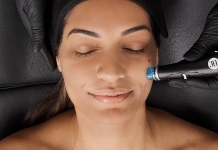Expert Advice: What you need to know when opening your home-based salon
Marie-Louise Coster advises on the essential actions you must take when launching a beauty or hair business in your home.
 I don't need to tell you that Covid has changed everything. It has changed the way we feel, the way we think, the way we live and the way we work. With lots of high street salons having closed down, and many others deciding that they want something else from life, there is now a real surge in home-based salons.
I don't need to tell you that Covid has changed everything. It has changed the way we feel, the way we think, the way we live and the way we work. With lots of high street salons having closed down, and many others deciding that they want something else from life, there is now a real surge in home-based salons.
When I first opened my home-based salon 11 years ago, there was a real snobbery about going to a therapist based at home. I am not sure if clients thought they were going to turn up and receive their facial in my lounge whilst my husband was sat watching the TV with his dinner on a tray, but some just would not entertain the idea of coming to me because I was based at home.
That snobbery is something that is almost non-existent now.
There are many considerations when working from home and it's not as easy as just putting a couch in the spare room and away you go, so let's get the legalities out of the way first.
Insurance and mortgage implications
You obviously need your professional, product and public liability insurance, you also need to be insured - under your own home insurance - for the fact that you have the general public coming into your home. If your treatment room is upstairs and the client has an accident and falls down the stairs, for example, you must be insured.
Now in my personal experience of speaking to home insurers I have only ever found two (in the UK) that will provide adequate cover so please do your research. You also have to inform your mortgage provider that you are planning to work from home, they may ask for proof of your various insurances, including your home insurance covering you for the public coming to the house.
Whilst we are on the subject of houses, if you are in rented accommodation, you can't really work from home without your landlord's permission. It isn't your house so you don't have the authority to inform the mortgage company etc. and in the event that you were to be sued for something that happened on the premises, the landlord/homeowner would also be liable and if they didn't give permission for you to work from home in the first place, they too could take legal action against you.
If you are in rented accommodation and you want to work from home speak to the landlord as he or she may be happy for you to do so but will put together a separate lease or agreement so as you have a legal contract.
Your Local Authority
You need to speak to are your local council. They will need to be informed that you are working from home, and you may need to apply for change of use and could be liable to pay business rates, just like any other business.
If you are going to be carrying out treatments such as electrolysis, ear piercing or laser treatments, you will also need to speak with the Environmental Health Department who will want to come out and check your hygiene standards and check you comply with local by laws. Once you comply they will issue you with a certificate to be displayed.
HMRC
HMRC must also be notified that you are going to be working self-employed, you can do this yourself by visiting their website, or calling them.
Alternatively, if you appoint an accountant they will do all of this on your behalf, but you must be registered as you will be liable to pay tax and National Insurance.
If you are working on a small scale and as a sole trader, you may decide that you don't want to go down the route of appointing an accountant to do your books as you can manage them yourself, and that's absolutely fine. Personally, I have an accountant as it is one less thing for me to do and I don't have the worry of tax returns etc.; someone else is at fault if it is wrong!
Professionalism
One thing I do want to stress is that whether you are working from home, or you have a high street salon, the standards and professionalism should be no different. Your room should be a room that is designated specifically to your work and it's not just a case of setting up in your dining room whenever you have a client booked in. If you cannot designate a room to be a specific treatment room, then perhaps working mobile would be more appropriate.
Your home salon should be set up in exactly the same way that a treatment room in a salon is, and if you have extra space for a designated reception or relaxation area, all the better.
Like any treatment room, it should be well decorated to create a relaxing ambience with music, lighting and, of course, all of the equipment required to carry out the treatments you are going to offer.

You need to be accessible to a toilet and running water, and ideally you want (where possible) for your room to be in such a position in the house that clients don't have to walk all through the house to get to it.
Also, consider if you will wear a uniform. I think something that is specifically for work is important, jeans are not appropriate but something smart, maybe black trousers and a top, or a black dress, a logoed apron etc. to reinforce your professionalism.
Business name and marketing
You will need a business name, and as you don't have a shop front you will have to work much harder for clients because they just won't know that you are there. Advertising, networking and marketing the business will be essential. Social media, local press and literature that you can display in other local shops or use as leaflet drops are all great ways to spread the word.
Opening hours
Have set working days and hours and stick to them; sometimes clients think that because you work from home it's ok to call you at 10pm at night but if your opening hours are until 8pm then it isn't appropriate.
The same with emails and text messages, if you want to reply to them on a Sunday or after your working hours that's entirely up to you but once you start there will be no stopping.
Treatment offerings
Decide on the treatments that you are going to offer and brands you are going to use and work out all of your costings. I know it's boring but it has to be done, there is no escaping it! You have to make sure you are covering your costs and make a profit otherwise there is just no point doing it; the love of what you do, as important as that is, does not pay the bills.
If 2022 is the year that you take the plunge to start a home-based business, write a business plan, do your research and don't rush your opening. I know I bang on about it but this is just the most wonderful industry to be part of, so be proud of what you do and don't do anything half-hearted; do it with passion or don't do it at all. Be a destination therapist that clients travel far and wide to come to and show clients what true professionalism and a proper salon experience is.
Marie-Louise Coster is a Session Tech, Beauty Therapist, Trainer and Business Consultant, with over 20 years' experience in the industry. All About Mi Beauty & Holistic Training School is ABT-accredited.

-13546.png)






